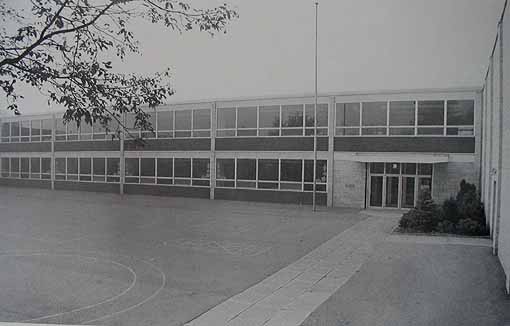On August 28, 1905, a new school year began for about 50 children in a building on the corner of Selkirk and McGregor. The building, which no longer exists, was called Edinger Hall, and was used as a social club for Ukrainian people in the area. Most of the children who attended the school were from families who recently immigrated to Canada, and most couldn’t understand English.
The children were taught by two young Sisters who recently immigrated from Lviv themselves, and who belonged to the order of Sisters Servants of Mary Immaculate – Sr. Athanasia Melnyk and Sr. Alexia Chykalo. When classes began in 1905 for those 50 students in the cramped facilities at Edinger Hall, the first Ukrainian Catholic grade school in North America was created. That school evolved into what is presently known as Immaculate Heart of Mary School.
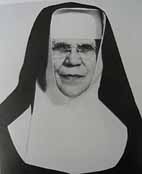
The idea of creating a school in Winnipeg’s north end to serve the needs of the Ukrainian people was originally conceived by the Basilian Fathers.
With the influx of Ukrainian immigrants to Winnipeg at the turn of the century, Father Matthew Hura, OSBN, recognized the need to educate the children of these families. After contact with the Mother General of the Congregation of the Sisters Servants of Mary Immaculate, Sr. Athanasia Melnyk and Sr. Alexia Chykalo arrived in Winnipeg on June 16, 1905 to set up their new mission and to prepare for the upcoming school year.
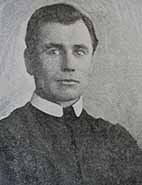
The two Sisters taught at Edinger Hall for about a year before moving the school a block south into the basement of the newly constructed St. Nicholas Church. St. Nicholas Church, the first Ukrainian Catholic Church in Winnipeg, was located on the corner of Stella and McGregor Avenue on the current site of Selo Villa.
Enrolment at the school increased to about 160 students, and the teaching staff increased to three with the addition of Sr. Nicholas Petrushkervich. The Basilian Fathers, who operated out of St. Nicholas Church, also helped with some of the teaching duties, especially catechism and Ukrainian. They also provided much needed financial and moral support to the Sisters. The following year, in 1907, the Basilian Fathers transferred complete control of the school to the Sisters Servants of Mary Immaculate.
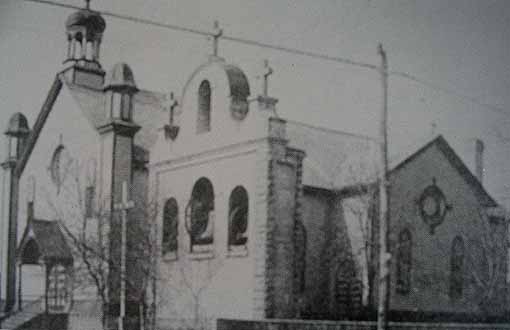
Although conditions in the basement of St. Nicholas Church were poor, the school survived the next few years due to the sacrifice, prayer, and hard work of the Sisters. They raised money for the school by charging a tuition fee of 50 cents a month, and by organizing concerts, bazaars, and teas. They also received support from the Basilian Fathers and other benefactors. One of these benefactors, Archbishop Adelard Langevin of St. Boniface, was able to secure a financial contribution of $25,000 to build a new school for the Sisters. On October 24, 1911, only a few months after the announcement of its construction, St. Nicholas School opened on the corner of Flora and McKenzie.
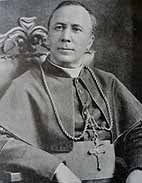
St. Nicholas School at 650 Flora was built in 1911
St. Nicholas School was a two storey brick building that consisted of 5 large classrooms, a chapel, and a residence on the top floor for the Sisters. Within the Ukrainian community, enthusiasm for the new school was high, and by 1914 enrollment quickly jumped to 240. It steadily increased over the years, and in 1920 reached as high as 400 students. At times the school was so overcrowded that students were turned away.
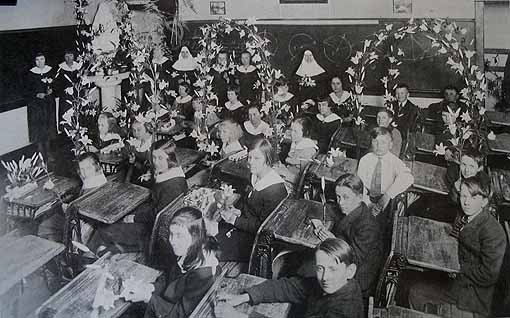
Moving out of the St. Nicholas Church basement to a newly built school greatly improved the quality of education for the students. However, operating such a large building was a huge financial burden for the Sisters. For the next 20 years, they did what they could to raise money, and often resorted to canvassing door to door for donations. Times were especially difficult during World War I and the Depression of the 1930’s when many families had a difficult time paying tuition fees.
In order to assist the Sisters in their mission work, a group of concerned parents formed the Benefit School Committee in 1931. The committee met every two weeks and organized fund raising activities to help maintain the general upkeep of the school.
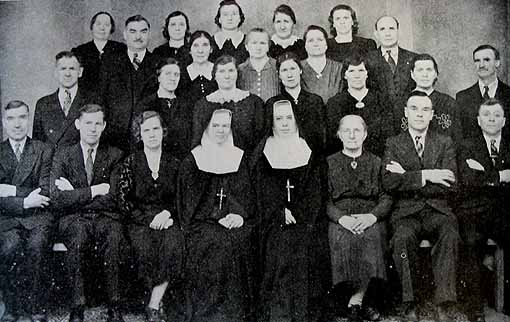
As the years progressed, St. Nicholas School continued to serve the needs of the Ukrainian community in Winnipeg. In 1933, it accepted students for grades 9 and 10, and by its 50th anniversary in 1955, the grades extended from Kindergarten to grade 12.
In order to accommodate its expanded role, it became apparent that more space was needed. Accordingly, in the mid 1950’s, the Sisters Servants of Mary Immaculate moved out of the school, and took up residence at 131 Aberdeen Avenue behind the newly purchased Holy Family Nursing Home (formerly the old Children’s Hospital) on the corner of Main and Redwood, where they remain to this day.
In 1957, they opened a short-lived all girls school called Immaculate Heart of Mary Academy at the same residence.
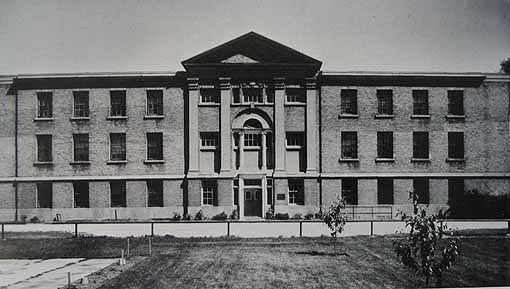
By 1961, St. Nicholas School was 50 years old, and the building needed major renovations to satisfy newly implemented fire code requirements. After a thorough investigation, the decision was made to demolish the old structure and erect a new school on the same site.
Two former students of St. Nicholas School, Walter Paschak and Walter Sahan, accepted the job of heading a Building Committee dedicated to raising the funds necessary to complete construction of the building.
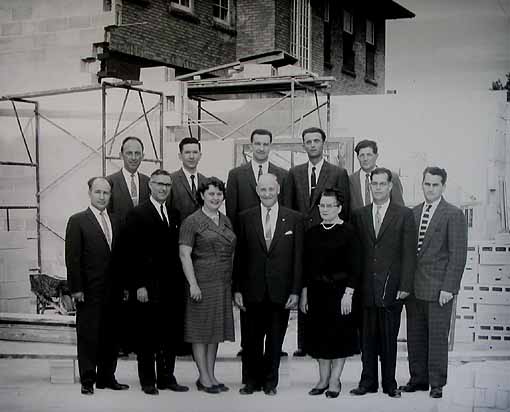
Construction began on November 2, 1961, and lasted for eighteen months. Since the new school was owned and operated by the Sisters Servants of Mary Immaculate, and in order to emphasize the fact that it was inter-parochial and intended to serve the needs of Ukrainian children from all parishes, the name was changed to Immaculate Heart of Mary School.
A year and a half later, on April 28, 1963, over 2000 people braved rainy weather to attend the opening of the new school as it was solemnly blessed in a ceremony conducted by His Grace, Archbishop-Metropolitan Maxime Hermaniuk. The opening was also attended by Premier Duff Roblin, Archbishop George Flahiff, Bishop Andrew Roborecki of Saskatoon (a former student of St. Nicholas School), and Mother General Jerome Chimy, SSMI.
Hundreds of people toured the school that afternoon, and many commented on its ultra-modern design and use of windows for natural light in both the classrooms and hallway. In order to reduce future maintenance costs, high quality building materials like mahogany and pre-finished walnut paneling were used in construction, and the school was fitted with wall to wall carpeting throughout to give the building a warmer and quieter atmosphere.
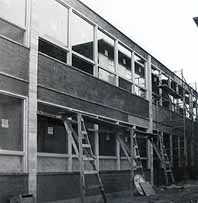
The cornerstone at the entrance to I.H.M.S. is a tribute to St. Nicholas School, built in 1911. The I.H.M.S. cornerstone on the gym, dated 1962, indicates the year that construction of the gym was completed. The rest of the school was actually completed in 1963.
The final build cost had risen from an initial estimate of $200,000 to approximately $300,000.
Four months later, on September 3rd, 1963, two hundred and forty one students from K-12 attended classes at I.H.M.S. for the first time. Although high school students from the old Immaculate Heart of Mary Academy moved in that fall, two years later I.H.M.S. eliminated its senior high grades, and settled on a K-8 format.
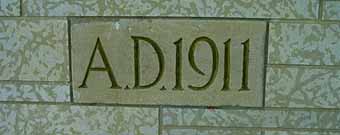
The opening of Immaculate Heart of Mary School in 1963 was an important milestone in the history of the Ukrainian community in Winnipeg. Almost 60 years after its humble beginnings at Edinger Hall, a new era of the school had been reached. Despite tremendous hardships and huge financial losses in keeping the old St. Nicholas School open, the Sisters Servants of Mary Immaculate never abandoned their original mission of providing a Ukrainian-Catholic education in the tradition of their forefathers. To this day Immaculate Heart of Mary School remains a living monument to those traditions.
